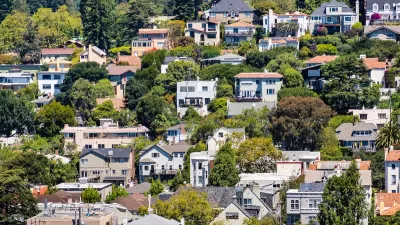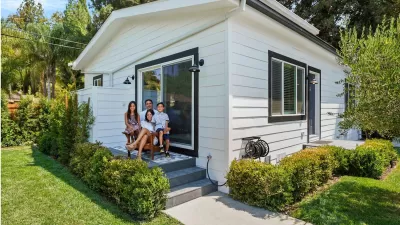Don't call them granny flats or inlaw units! These are separate units that can only be built on lots of 4,000 sq. ft. minimum. Only 50 have been built or permitted since the trial began in 2006. The goal is to bring affordabllity to SFH neighborhoods
The Seattle City Council supported them as a means to bring infill and modest densification to Single-Family-Home neighborhoods where traditional multifamiliy housing would be incompatible. Yet as the article points out, neighbors may resist even these modest changes. On top of the usual parking issues, an architect notes privacy infringement for guests who might wish to "walk around naked", and an arborist states it would "decimated the urban forest".
"It's harder and harder for working people to live in the city," says former Seattle mayor Greg Nickels, now a fellow at the Harvard University Institute of Politics."
"Nickels had been intrigued by the idea of backyard cottages for decades before he became Seattle's mayor in 2002 and made it a priority. Opponents argued that it would double the city's density, he recalls, but he felt "there was no excuse other than political cowardice not to move forward."
"Other cities such as Denver and Faribault, Minn., are allowing for the first time or expanding programs that encourage backyard residences to accommodate growing demand for affordable housing in the wake of the recession and foreclosure crisis."
FULL STORY: Seattle's backyard cottages make a dent in housing need

Trump Administration Could Effectively End Housing Voucher Program
Federal officials are eyeing major cuts to the Section 8 program that helps millions of low-income households pay rent.

Planetizen Federal Action Tracker
A weekly monitor of how Trump’s orders and actions are impacting planners and planning in America.

The 120 Year Old Tiny Home Villages That Sheltered San Francisco’s Earthquake Refugees
More than a century ago, San Francisco mobilized to house thousands of residents displaced by the 1906 earthquake. Could their strategy offer a model for the present?

Washington State Legislature Passes Parking Reform Bill
A bill that would limit parking requirements for new developments is headed to the governor’s desk.

Missouri Law Would Ban Protections for Housing Voucher Users
A state law seeks to overturn source-of-income discrimination bans passed by several Missouri cities.

Op-Ed: Looking for Efficiency? Fund Intercity Buses
Much less expensive than rail, intercity buses serve millions of Americans every year, but public subsidies are lacking.
Urban Design for Planners 1: Software Tools
This six-course series explores essential urban design concepts using open source software and equips planners with the tools they need to participate fully in the urban design process.
Planning for Universal Design
Learn the tools for implementing Universal Design in planning regulations.
Ada County Highway District
Clanton & Associates, Inc.
Jessamine County Fiscal Court
Institute for Housing and Urban Development Studies (IHS)
City of Grandview
Harvard GSD Executive Education
Toledo-Lucas County Plan Commissions
Salt Lake City
NYU Wagner Graduate School of Public Service





























